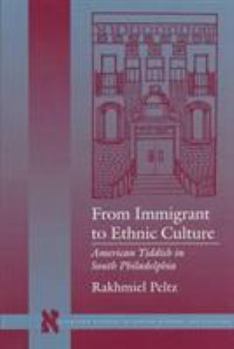From Immigrant to Ethnic Culture: American Yiddish in South Philadelphia
(Part of the Stanford studies in Jewish history and culture Series)
Select Format
Select Condition 
Book Overview
This book provides a fresh look at ethnic culture in the contemporary United States through an ethnographic account of everyday life in the Jewish community of South Philadelphia. By embracing the language and traditions of their childhood, elderly Jewish residents, the children of immigrants, create a path for the transmission of immigrant culture. The work highlights the role of language in collective memory. The residents' use of Yiddish and their warm attitude toward the language illuminate their changing and overlapping identifications with the neighborhood, their non-Jewish neighbors, Jewish traditions and religion, and their children and parents. The book serves as a corrective to the view of the second generation that concentrates solely on the framework of mobility and rejection of one's parents' culture, neglecting the importance of life cycle changes. It depicts children of immigrants as crucial interpreters of the culture of the immigrants' homeland as they forge a meaningful existence for themselves and their own children. In the course of the work, the author documents and analyzes for the first time the Yiddish speech of American Jews. He examines the cultural implications of the use of English in Yiddish speech, as well as the change in Yiddish sounds and verbal forms. Throughout, the author carefully examines his own role in revitalizing Yiddish in South Philadelphia as he established close relationships with elderly Jews, meeting them in their homes, shops, and senior center, and leading a Yiddish conversation group at the community center. He thus provides a thoughtful contribution to the methodological discussion among anthropologists, sociologists, and linguists of the paradoxes inherent in participant-observer studies.
Format:Hardcover
Language:English
ISBN:0804730202
ISBN13:9780804730204
Release Date:December 1997
Publisher:Stanford University Press
Length:292 Pages
Weight:1.35 lbs.
Customer Reviews
0 rating





